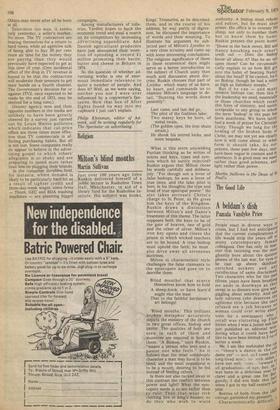Milton's blind mouths
Martin Sullivan
Just over 100 years ago John Ruskin delivered himself of a public lecture in Rusholme Town Hall, Manchester, in aid of a library fund for the Rusholme Institute. His subject was books,
Kings' Treasuries-, as he described them, and in the course of his address, by way partly of digression, he discussed the importance of words and their meaning. To illustrate his argument he subjected part of Milton's Lycidas to a very close scrutiny and came up with some interesting conclusions. The religious significance of them in these ecumenical days might serve as a better introduction to the subject of Church unity than much arid discussion about doctrine. Ruskin chooses that part of Lycidas which many of us have, by heart, and commands us to examine Milton's language in detail, "Hunting the words down patiently":
Last came, and last did go, The pilot of the Galilean lake; Two massy keys he bore, of metal twain, (The golden opes, the iron shuts amain,) He shook his mitred locks, and stern bespake.
What is this stern unyielding Puritan thinking as he writes of mitres and keys, types and symbols which he surely rejected? Ruskin argues that Milton chose his words carefully and deliberately. "For though not a lover of false bishops, he was a lover of true ones; and the lake pilot is here, in his thoughts, the type and head of true episcopal power." He also takes seriously Christ's charge to St Peter, as He gives him the keys of the Kingdom. Ruskin draws a distinction between Milton's and Dante's treatment of this theme. The latter supposes both the keys to be of the gate of heaven, one of gold and the other of silver. Milton's iron key opens and closes the prison in which wicked teachers are to be bound. A true bishop must uphold the faith; he must also drive away all erroneous doctrines.
Milton in characteristic style challenges the false claimants to the episcopate and goes on to describe them: Blind mouths! that scarce themselves know how to hold A sheep-hook, or have learn'd aught else the least That to the faithful herdsman's art belongs!
'Blind mouths.' This brilliant broken , metaphor accurately depicts the ministry of the church in two great offices, bishop and pastor. The qualities of both are seen in each of them and moreover are required in both of them. "A Bishop," says Ruskin, "means a person who sees and a pastor one who feels." So it follows that the most unbishoply character a man may have is to be blind, and the most unpastoral is to be a mouth, desiring to be fed instead of feeding others.
Is there not also tucked away in this contrast the conflict between power and light? What the episcopate needs is to see rather than to rule. They that wear rich clothing live in king's houses; so do they who wish to wield authority. A bishop must rebuke and exhort, but he must shun power. His office is to oversee the sheep, not only to number therm but to know them by name.
Ruskin presses the point home: "Down in the back street, Bill and
Nancy knocking each other's teeth out — Does the bishq know all about it? Has he an eye upon them? Can he circumstan' tially explain to us how Bill got into the habit of beating NancY about the head? If he cannot, he is no Bishop, though he had a mitre as high as Salisbury steeple." But if he can — and manY modern bishops can, then. this is the leadership we need, essentiallY
in those churches which retain this form of ministry, and surelY acceptable to any group to whom the term 'bishop' in the past has I
been anathema. We have latelY had a week of prayer for Christian Unity. Though we long for the healing of the broken body of Christ, we may not yet see clearlY how it will come about or what form it should take. So our prayers, these past few days, maY have been vague in content and in, utterance. It is good men we need rather than good schemes, and light rather than power.
Martin Sullivan is the Dean of 91 Paul's.


































 Previous page
Previous page